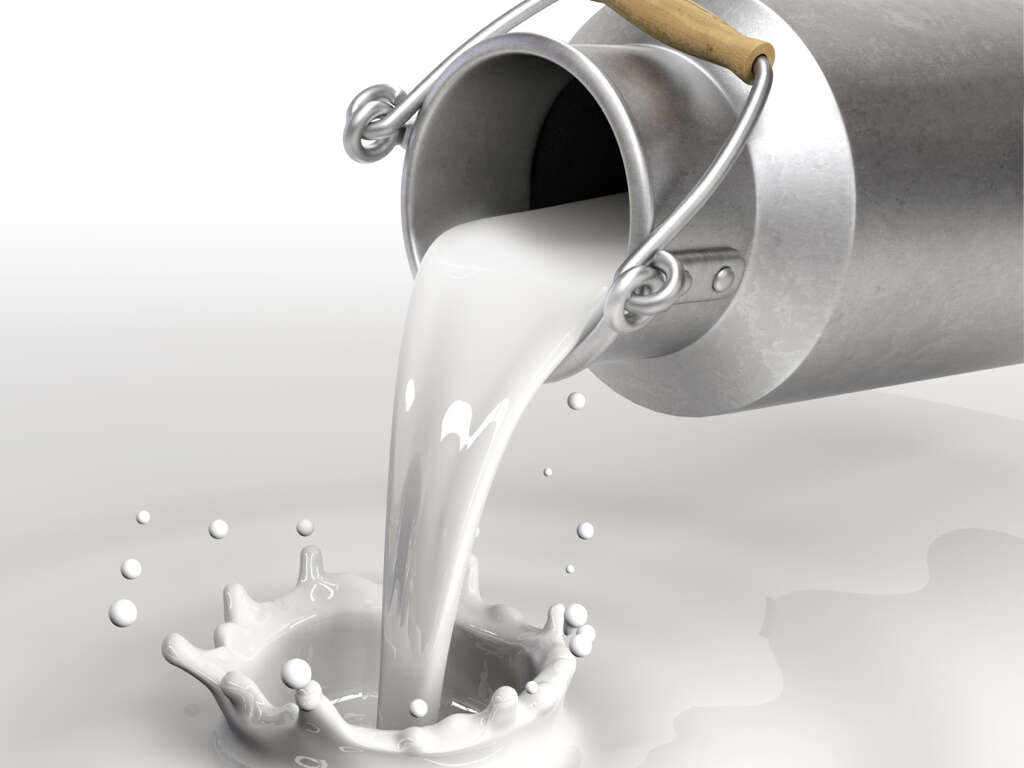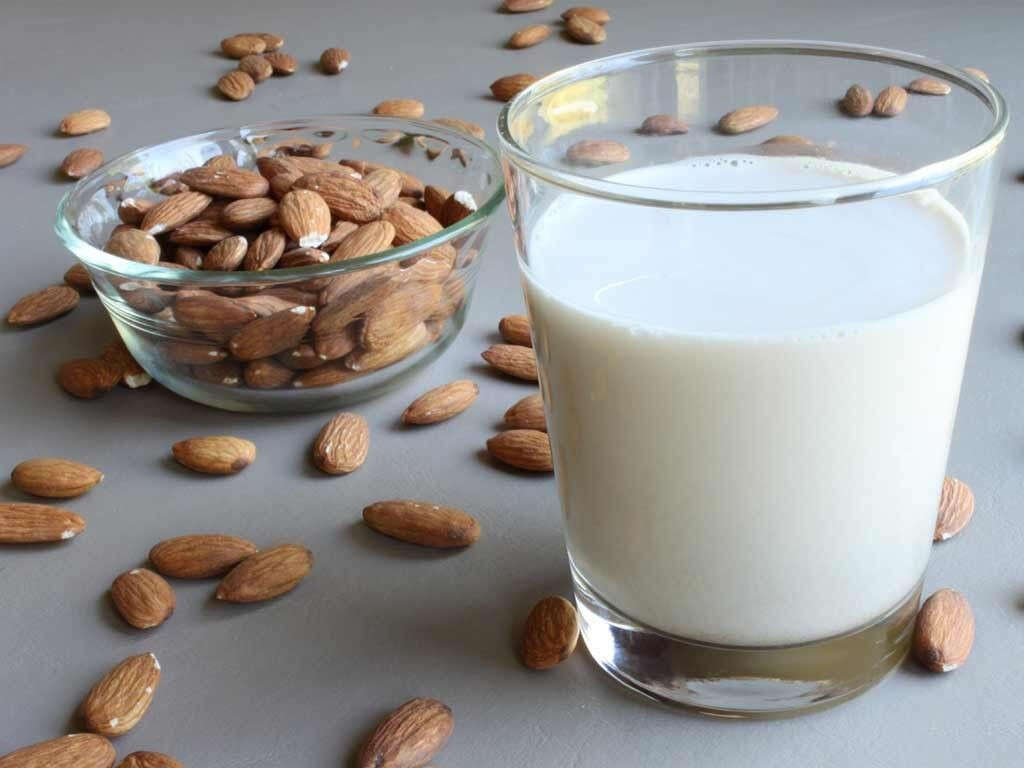10 Health Benefits of Almond Milk
Almond milk has recently been a trending topic worldwide and for good reason. It’s a very nutritious drink with few calories. In order to make almond milk, almonds are crushed, mixed with water, and then the mixture is filtered to make a final product that resembles milk with a nutty taste.
Usually, nutrients such as calcium, vitamin E, vitamin D, and others are added to almond milk to make it more nutritious. There are a lot of almond milk products available; however, some people prefer to make it at home.
This article looks at 10 health benefits of almond milk that will interest you.
Almond Milk Benefit #1: Low in Calories
Almonds contain more calories than almond milk; that is a fact. Almond milk is partially processed and is, therefore, lower in calories than almonds; a great choice for people who want to lose weight. One cup of almond milk contains 40 to 50 calories while one cup of dairy milk contains 140 to 150 calories. Imagine the difference switching to almond milk would make.
The most effective way to lose weight is by decreasing your calorie intake along with exercising. If you are diabetic, losing weight can be positive as it can lead to better control of your blood sugar levels.
Almond Milk Benefit #2: Low in Sugar
There are two types of almond milk: sweetened and unsweetened. Unsweetened almond milk is very low in sugar. The same amount that contains 40 to 50 calories contains about 1 to 2 grams of carbohydrates and dietary fiber, which is very beneficial to the body. The equivalent amount of dairy milk that contains 140 to 150 calories also contains 13 grams of carbohydrates, which is mainly sugar that is not very beneficial.
Note that commercial almond milk is usually sweetened with sugar. One cup of commercial almond milk may contain 5 to 17 grams of sugar. This is why it is essential to check the nutritional facts before purchasing.

Almond Milk Benefit #3: Lactose-Free
People who are lactose intolerant can’t digest lactose that is present in ordinary milk. For this reason, they can’t consume milk or milk products like cheese, butter, and ice cream. Lactose intolerant patients don’t have lactase, the enzyme responsible for breaking down lactose into a simpler form that is easily digestible.
Causes of lactose intolerance include genetics, old age, and certain diseases. Its symptoms include stomach disturbance, excess gas, and bloating. The rates of lactose intolerance are very high in some areas. However, most people are unaware of it and may therefore continue suffering. Because almond milk does not contain lactose, it is a popular alternative to milk among lactose intolerant people.
Almond Milk Benefit #4: High in Vitamin E
A serving of 28 grams of almond contains 37 percent of the daily vitamin E requirements. Commercial almond milk may contain even more vitamin E. One cup of almond milk contains 40 to 50 percent of the recommended daily intake of vitamin E. However, each brand contains different amounts, although they all contain vitamin E, while dairy milk does not contain vitamin E at all.
Vitamin E is one of the most potent antioxidants that fight against inflammation and stress. It protects our hearts, prevents cancers and other conditions like high blood pressure, and is also essential for bone and eye health. Taking almond milk on a regular basis is one way to help your body get a steady supply of vitamin E.

Almond Milk Benefit #5: Rich in Calcium
We consume milk and other dairy products in order to get our daily calcium requirements. However, one cup of milk provides only 28 percent of the recommended daily intake of calcium. On the other hand, every 28 grams of almonds contains about 7 percent of calcium. Almond milk is usually fortified with enough calcium to make sure that people who take it get the recommended daily intake of it since most people use almond milk as an alternative to dairy products.
Calcium is essential for strong bones and teeth. Taking the recommended daily intake of calcium prevents pathological fractures and osteoporosis. It is also essential for the health of the heart, nerves, and muscles.
Almond Milk Benefit #6: Contains Vitamin D
Vitamin D is an essential micronutrient for good health and specifically for a healthy heart, bones, immune system, and other body functions. Our bodies are able to produce vitamin D by exposing the skin to sunlight. However, there are many factors preventing our bodies from producing sufficient amounts of vitamin D, including skin color, modern lifestyles, and living in areas where the sun itself is limited.
Vitamin D deficiency is associated with a long list of diseases including heart problems, cancers, pathological fractures, muscle weakness, infertility, and infections. This is why manufacturers of almond milk fortify it with vitamin D.

Almond Milk Benefit #7: Suitable for Vegans
Some people don’t take dairy milk or dairy products due to cultural, religious, health, or environmental reasons. If you’re a vegan and wonder if you can consume almond milk or not, the answer is yes, almond milk is suitable for vegans. Many commercial almond milk products are totally plant-based and suitable for people who want to replace dairy milk with other milk.
Also, almond milk does not contain the proteins that cause milk allergies. Traditionally, soy was the automatic choice for people seeking an alternative to dairy milk. However, 14 percent of people can’t handle soy because they are allergic to it. This is why almond milk is now the optimal choice.
Almond Milk Benefit #8: Low in Phosphorus and Potassium
People suffering from chronic renal problems don’t consume milk or other dairy products because they contain high levels of phosphorus and potassium. If they consumed dairy products, their kidneys wouldn’t be able to remove the unnecessary nutrients, leading to their accumulation in blood and subsequently, problems such as hyperphosphatemia and hyperkalemia, which affect the heart and may lead to death.
Having a chronic renal disease comes with massive changes to your lifestyle, including avoidance of dairy products. Dairy milk contains 233 mg of phosphorus and 366 mg of potassium per cup, while the same amount of almond milk contains only 20 mg of phosphorus and 160 mg of potassium. Almond milk is, therefore, a great choice for people looking to decrease their intake of potassium and phosphorus. Just search for brands that don’t add these minerals to their almond milk.

Almond Milk Benefit #9: Easy to Add to Your Diet
How do you like to take milk? Whatever your answer, you can consume almond milk exactly the same way. You can drink it directly or add it to your cereal or oats for a nutritious breakfast. You can also add it to your tea, coffee, smoothies, or other drinks.
Alternatively, you can use it while cooking things like pancakes or add it to soups and sauces. If you love ice cream or yogurt, you can go for these delicacies made from almond milk. This is even more important if you are lactose intolerant. Just use it in exactly the same way you would use dairy milk.
Almond Milk Benefit #10: Easy to Make
There are many commercial brands of almond milk available in supermarkets. However, you can also make it at home. All it takes is a blender, almonds, and some water.
Here are the steps to follow when making your own almond milk at home: Remove the skin from the almonds by soaking the nuts in water for 12 hours. Rinse the almonds and at the same time remove the softened skins. Now, put the almonds in a blender, add 4 cups of water for each cup of almonds, and blend well. Get a nut milk bag or a cheesecloth and strain the mixture through it to remove any solids.
Now you have your homemade almond milk.











